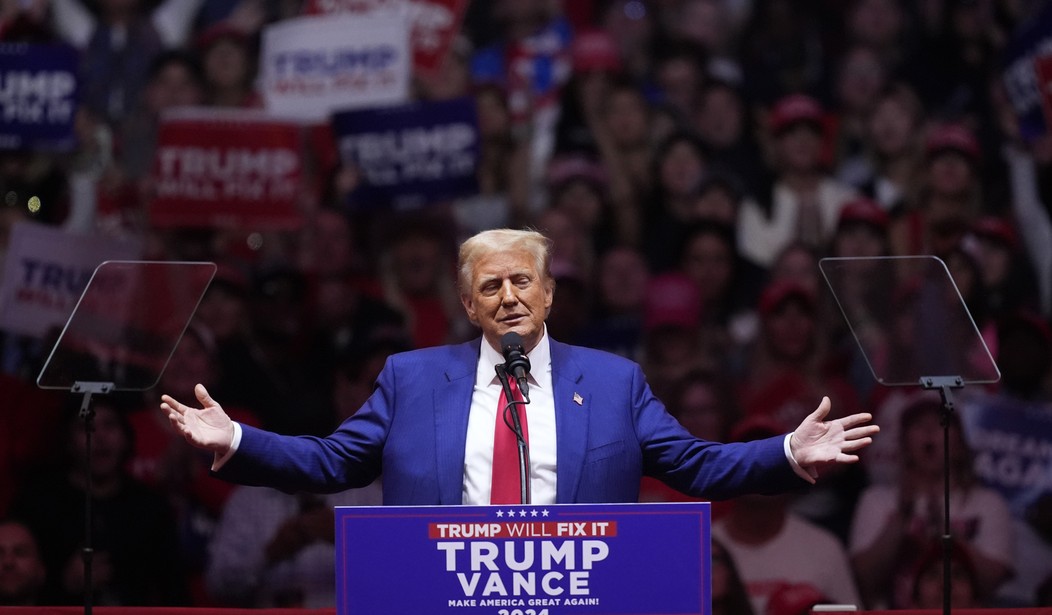It seems like years, but it was just one month ago that the media effort to stop Donald Trump reached its final, most desperate phase in the closing days of the 2024 presidential campaign. The Atlantic published an article quoting two unnamed sources who said they heard Trump say, sometime during his first term in office, that "I need the kind of generals that Hitler had." That led the virulently anti-Trump publication to speculate about what it called Trump's "evident desire to wield military power, and power over the military, in the manner of Hitler and other dictators."
The article set off days of fevered Trump/Hitler speculation in some media outlets. And then the Hitler talk broadened with discussion of Trump's upcoming rally in New York's Madison Square Garden, scheduled a few days later on Oct. 27. Many commentators compared the event to the infamous Nazi rally held at the Garden in 1939. For example, after calling Trump a fascist, former rival Hillary Clinton said Trump would be "reenacting the Madison Square Garden rally in 1939."
During its coverage, MSNBC intercut footage from the old Nazi rally with video of the Trump rally. The network's Jonathan Capehart called the scene "particularly chilling, because in 1939, more than 20,000 supporters of a different fascist leader -- Adolf Hitler -- packed the Garden for a so-called 'pro-America rally.'" Late-night host Stephen Colbert noted positive coverage of the rally on Fox News and said: "Wow, how would they have covered Nuremberg? High-five enthusiasts thrilled by superstar Austrian painter's tiny mustache?" Such Trump-is-Hitler observations were quite common.
In reality, the rally was an epic event, "living, breathing proof of former President Donald Trump's success in broadening the appeal of the Republican Party." But when a comedian speaking hours before Trump told an unfunny and poorly received joke about Puerto Rico and garbage, the critics found a new reason to pounce. The New York Times called the rally "a closing carnival of grievances, misogyny and racism." And it just might, many speculated, cost Trump the election.
Recommended
The Hitler charge, so white-hot just a few days before, was refined a bit; in some media accounts, the Madison Square Garden rally became a festival of anti-Hispanic hate. Many anti-Trump voices in the media found that idea particularly appealing because polls had shown for months that Trump support was growing among Hispanic voters. Perhaps this could stop that progress and help Vice President Kamala Harris.
Politico reported that "Trump's Puerto Rico fallout is 'spreading like wildfire' in Pennsylvania," which had a significant Hispanic population and was, of course, considered the swing state that could determine the entire election. "To have this closing message at this stage is disastrous," declared CNN's Alyssa Farah Griffin. At the Daily Beast, the headline was "Trump in Denial Over Disastrous Latino-Bashing MSG Rally." And Fortune reported, "Trump just blew a huge lead, and the Madison Square Garden rally started the drop."
Suddenly, Trump's opponents sensed momentum. Top Harris adviser David Plouffe told CBS the rally was "the worst closing argument in the history of American politics." Everyone looked for a backlash. Hopes rose when a Latin entertainment star, Nicky Jam, who had endorsed Trump, withdrew the endorsement in a message to his 43.5 million Instagram followers. Was a reaction building?
No. A planned protest in majority-Hispanic Allentown, Pennsylvania, where Trump held his first rally after Madison Square Garden, went nowhere. A few protesters showed up, chanted a bit and left, while thousands attended the Trump event. Polls suggested that Trump's support among Hispanic voters was basically unaffected. And then, on Election Day, exit polls showed that Trump won a stunning 46% of the Latino vote -- a huge improvement over Republican performances in years past and one of the many factors contributing to his decisive victory over Harris.
What is striking, after Trump's victory in both the popular vote and the Electoral College, is how quickly the Hitler talk disappeared. Before the election, MSNBC's Joe Scarborough and Mika Brzezinski, two of Trump's most aggressive critics, called Trump a fascist and described the Madison Square Garden rally as "Nazi-like." After the election, they traveled to Florida for an audience with Trump, saying they wanted to "restart communications." With a Nazi?
The Hitler moment turned out to be a final convulsion rather than the new normal. Trump's victory, rather than ignite more fiery protests, brought at least a moment of relative peace. "While President-elect Trump's 2016 win sparked shock, outrage, and massive protests, the response to his 2024 has been more muted," Axios reported in "The Resistance goes quiet." One longtime Trump antagonist noted that "exhaustion is real" among those who have been protesting Trump for nearly a decade now.
Of course, there might be another Hitler moment at any time; the final days of the campaign were certainly not the first time Trump's adversaries have called him a Nazi. But the intensity of the rhetoric of Oct. 27 and the relative tranquility of Nov. 27 presents a striking contrast. In early 2025, unlike early 2017, Trump might, perhaps, have at least a brief opportunity to govern.

























Join the conversation as a VIP Member